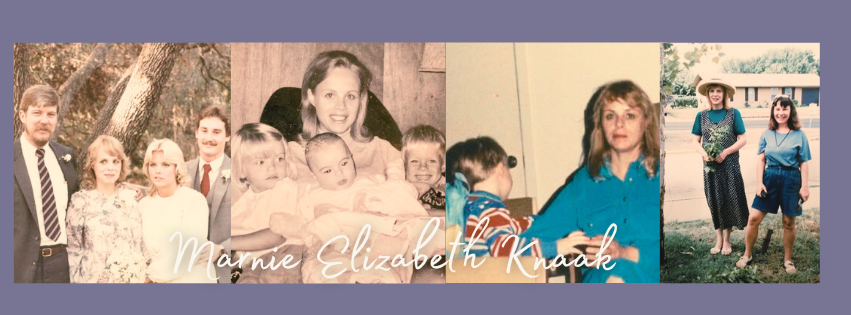Our Story
Born from deep love and shaped by profound loss, the Marnie Knaak Music & Resilience Foundation exists to show that healing is possible — and that music can be one of our greatest tools for connection and hope.
Marnie Knaak was a loving mother, dear friend, and firm believer in the healing power of music. When her tragic cut short in a house fire in 1996, her son Will — only eleven at the time — carried both her love and her lessons forward.
As he grew, music became Will’s way of making sense of grief and rediscovering joy. Will discovered firsthand how music could process pain, build connection, and foster resilience. That same belief 00 that healing begins when we feel safe, seen, and supported — is now the heart of this foundation.
Guided by Marnie’s values of compassion, creativity, and care, the foundation offers trauma-informed music education and creative therapy programs that help youth and their families find healing, resilience, and self-expression.
We understand that trauma can leave lasting marks — on the mind, the body, and the heart. That’s why our approach is built on safety, trust, and empathy. Through music, we create spaces where children and families can reconnect, build confidence, and rediscover a sense of hope and belonging.
Because when we feel safe enough to express ourselves, the music of healing begins.
Our Founding
For years, co-founder Liz Joshua held a dream close to her heart — to create a safe, trauma-informed music school where young people could heal, grow, and connect. That dream came to take shape when her children started lessons with Will Knaak, whose own story reflected the transformative power of music.
What started as a simple parent–teacher connection blossomed into a shared purpose: to build a place where music isn’t just learned — it’s felt, lived, and used to heal.
Together, Liz and Will joined forces with a passionate team to bring that vision to life — founding a nonprofit that honors Marnie’s memory and meets a deep need in the community; a place where every NOTE opens the door to resilience, connection and hope.
Our Story: Marnie’s Legacy
The Marnie Knaak Music & esilience Foundation was born out of both deep love and profound loss.
Marnie Knaak was a radiant spirit — a kind and loving mother of five, a devoted wife to George, and a loyal friend. She adored The Beatles, cherished family traditions, and believed in nurturing her child’s unique strengths and giving the space to shine. She was also a passionate advocate for her son Will’s education, working through the PTA, advanced learning programs, and athletics to ensure he had every opportunity to excel and exceed. Whether on the field, in the classroom, or at home.
Like so many, Marnie’s life was touched by hardship. She understood the silent weight of trauma and the courage it takes to keep showing up for others — even when carrying pain of your own. Yet through it all, she leaned on love, laughter, and music.
In 1996, tragedy struck when a fire claimed Marnie’s life. Her son, Will, then just eleven years old, and his father George survived — but their world changed forever. In the midst of loss and displacement, Will turned to the one thing that still brought him comfort: music.
Music had always been a thread for the Knaak family. George, a former member of the legendary 13th Floor Elevators, filled their home with rhythm, melody, and meaning. After the fire, he continued to share the passion, showing Will how music could carry them through grief, rebuild connection, and spark joy again.
For Will, music became more than a creative outlet — it became a lifeline. It helped him process pain, rediscover purpose, and reconnect with others. Guided by his mother’s compassion and his father’s resilience, Will transformed trauma into a mission: to help others find healing through music, too.
Years later, that mission took form as The Marnie Knaak Music & Resilience Foundation — co-founded by Will and community leader, Liz Joshua, who shared his belief in creating a safe, trauma-informed music school for children and their families.
Today, the Foundation stands as a living tribute to Marnie’s love, George’s strength, and Will’s journey of healing. Rooted in empathy and creativity, MKMRF provides trauma-informed music education and creative therapy programs that help young people find hope, confidence, and connection.
Because as its heart, this work is about more than music — it’s about belonging, resilience, and the belief that every child deserves the chance to heal and thrive.
🗝️ In Every Key, a Story. In Every Note, a Bond.
“Her memory lives on in every chord played, every voice lifted, and every life touched.”
— Will Knaak
At the Marnie Knaak Music & Resilience Foundation, we believe music is more than sound — it is a language of safety, hope, and transformation. With every note played and every lyric sung helps create spaces where young people feel seen, supported, and empowered to grow. can feel safe, supported, and empowered to grow.
Today, MKMRF is a vibrant, mission-driven nonprofit dedicated to nurturing emotional well-being through accessible, inclusive, and heart-centered music programs. Our trauma-informed approach honors Marnie’s legacy by ensuring that every student and family who walks through our doors feels safe, valued, and uplifted — one note, one voice, and one story at a time.




